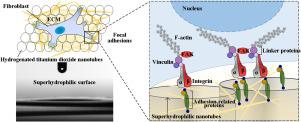Colloids and Surfaces B: Biointerfaces ( IF 5.8 ) Pub Date : 2020-11-24 , DOI: 10.1016/j.colsurfb.2020.111489 Caiyun Wang 1 , Xin Wang 2 , Ran Lu 2 , Shang Gao 2 , Yunhan Ling 3 , Su Chen 2

|
Soft tissue integration is critical for the long-term retention of dental implants. The surface properties including topography and wettability can impact soft tissue sealing. In our work, a thermal hydrogenation technique was applied to modify anodized titanium dioxide nanotubes (TNTs). However, the effects of the hydrogenated surface on soft-tissue cells remain unclear. The aim of the present study was to investigate the bioactivities of human gingival fibroblasts (HGFs) on structured surfaces, which determine the early formation of soft tissue sealing. Three groups were examined: commercially pure titanium (Ti), anodized TNTs (air-TNTs) and hydrogenated TNTs (H2-TNTs). Scanning electron microscopy showed the nanotubular topography on the titanium surfaces after anodization. Then, hydrogenation ensured that the H2-TNTs were superhydrophilic with a contact angle of 3.5 ± 0.8°. In vitro studies such as cell adhesion assays, cell morphology, immunocytochemistry, wound healing assays, real-time PCR and enzyme-linked immunosorbent assays displayed enhanced adhesion, migration, relative gene expression levels, and extracellular matrix synthesis of the HGFs on H2-TNTs. Interestingly, focal adhesion kinase activation and integrin-mediated adhesion seemed to be induced by the H2-TNT surface. Our results revealed that a superhydrophilic nanostructure modified by anodization and hydrogenation can improve the bioactivity of HGFs and connective tissue regeneration, which will further promote and expand the application of titanium dioxide nanotubes in dental implants.
中文翻译:

人牙龈成纤维细胞对超亲水氢化二氧化钛纳米管的反应
软组织整合对于牙种植体的长期保留至关重要。包括形貌和润湿性在内的表面特性会影响软组织的密封。在我们的工作中,热氢化技术被用于修饰阳极氧化的二氧化钛纳米管(TNT)。但是,氢化表面对软组织细胞的影响仍不清楚。本研究的目的是研究人牙龈成纤维细胞(HGF)在结构化表面上的生物活性,这决定了软组织密封的早期形成。检查了三组:市售纯钛(Ti),阳极氧化TNT(空气TNT)和氢化TNT(H 2-TNT)。扫描电子显微镜显示阳极氧化后钛表面上的纳米管形貌。然后,氢化确保H 2 -TNT为超亲水的,接触角为3.5±0.8°。体外研究(例如细胞粘附测定,细胞形态学,免疫细胞化学,伤口愈合测定,实时PCR和酶联免疫吸附测定)显示HGF在H 2-上的粘附,迁移,相对基因表达水平和细胞外基质合成增强。 TNT。有趣的是,H 2似乎诱导了粘着斑激酶激活和整联蛋白介导的粘附。-TNT表面。我们的研究结果表明,通过阳极氧化和氢化改性的超亲水纳米结构可以改善HGF的生物活性和结缔组织再生,这将进一步促进和扩大二氧化钛纳米管在牙科植入物中的应用。


























 京公网安备 11010802027423号
京公网安备 11010802027423号